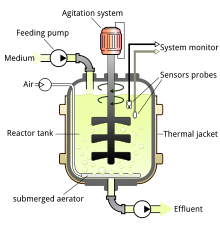
Back علم الأحياء الدقيقة الصناعي Arabic Microbiología industrial Spanish Microbiologie industrielle French औद्योगिक सूक्ष्मजैविकी Hindi 산업미생물학 Korean വ്യാവസായിക-സൂക്ഷ്മജൈവശാസ്ത്രം Malayalam Microbiologia industrial Portuguese කාර්මික ක්ෂුද්රජීව විද්යාව Singhalese Endüstriyel mikrobiyoloji Turkish Mikrobiologiya sanoati Uzbek

Industrial microbiology is a branch of biotechnology that applies microbial sciences to create industrial products in mass quantities, often using microbial cell factories. There are multiple ways to manipulate a microorganism in order to increase maximum product yields. Introduction of mutations into an organism may be accomplished by introducing them to mutagens. Another way to increase production is by gene amplification, this is done by the use of plasmids, and vectors. The plasmids and/ or vectors are used to incorporate multiple copies of a specific gene that would allow more enzymes to be produced that eventually cause more product yield.[1] The manipulation of organisms in order to yield a specific product has many applications to the real world like the production of some antibiotics, vitamins, enzymes, amino acids, solvents, alcohol and daily products. Microorganisms play a big role in the industry, with multiple ways to be used. Medicinally, microbes can be used for creating antibiotics in order to treat infection. Microbes can also be used for the food industry as well. Microbes are very useful in creating some of the mass produced products that are consumed by people. The chemical industry also uses microorganisms in order to synthesize amino acids and organic solvents. Microbes can also be used in an agricultural application for use as a biopesticide instead of using dangerous chemicals and or inoculants to help plant proliferation.
- ^ "Industrial Production of Antibiotics [in: Section - Microbial Products in the Health Industry]". Microbiology. LibreTexts: Curation and revision provided by Boundless.com. January 2021. p. 17.2A. Book (Page) ID: 8622; CC BY-NC-SA 3.0
{{cite book}}: CS1 maint: postscript (link)